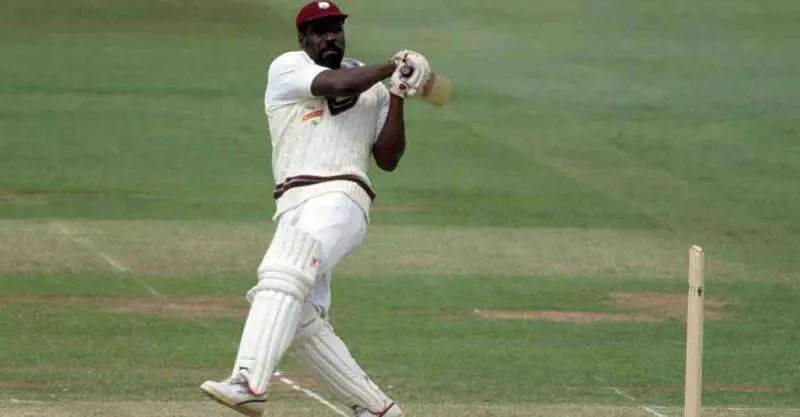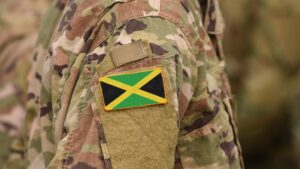
The man who overshadowed Viv Richards
With the 2023 50-over cricket World Cup now well underway, Caribbean cricket fans must be ruing their team’s absence from one of cricket’s most prestigious tournaments, and it is a sad sign of how far the West Indies have fallen that their once-great team failed to make the cut.
These are now dark days for West Indies cricket. But there was a time when they were favourites for all global tournaments, such as in 1979 at the second staging of the World Cup contested in England.
By the time the competition rolled around, Viv Richards was the best batter in the game. It wasn’t even close. The Antiguan sat unchallenged on the throne as king. There were a number of great batters around: Greg Chappell, Barry Richards, and Sunil Gavaskar come readily to mind, but they all dwelt in Richards’ shadow. Nobody could upstage him.
And yet, one day someone did. It was the 1979 World Cup final at Lords and the West Indies were in some trouble. England asked the Caribbean side to bat upon winning the toss. Gordon Greenidge, Desmond Haynes, Alvin Kallicaharran, and Clive Lloyd fell fairly cheaply, leaving the West Indies 99/4 in the 31st over when Collis King joined the Master Blaster. By the time the Barbadian departed in the 51st over, West Indies had reached 238/5, a stunning turnaround at the time.

Their union produced 139 runs. Unbelievably, King’s share was 86; meaning, he had significantly outscored the man who wielded the most dreaded blade in the game. By the time the West Indies completed their 60 overs — limited overs games in England in those days were 60 overs — the score was 286/9, and Richards, awarded Man-of-the-Match, was unbeaten on 138.
Yet Richards agrees that it was King who took charge of the innings and allowed them to reach what was then an intimidating score. The eventual margin of victory was 92 runs, as the West Indies irresistible four-pronged pace attack dismissed the hosts for 194, despite a 129-run opening partnership between Mike Brearly and Geoffrey Boycott. Joel Garner was the main destroyer, with 5/38 off 11 overs. Colin Croft captured 3/42 off 10, while Michael Holding, in a miserly display, had 2/16 off eight.
So long as you were willing to put aside the inevitable feeling of inadequacy, batting with Richards must have been quite pleasant. Think of it: since there was hardly any attack or any bowler capable of tying him down for any prolonged period, there would be very little scoreboard pressure. Additionally, you would have a front-row seat to what was the finest travelling show in cricket.
His capacity for mayhem was so far ahead of everyone else’s that nobody thought there was a batsman breathing that could outshine him from the other end. The World Cup final, contested on cricket’s most prestigious ground, was the game’s biggest stage and provided the perfect context for a memorable performance from the master. And though he didn’t disappoint, it was King who commanded the stage that day, forcing Richards out of his usual lead role and into that of supporting cast.
“I can remember him getting 70 odd (it was actually 86),” Richards told Richie Benaud, “and he just hit it to all parts of the ground…and I just stayed there at the other end admiring every bit of it until he was out, then I decided, ‘Well, I’ve seen what a guy can do, why not take over?’ “
Those of us following by radio in the Caribbean could scarcely believe what was unfolding. King was by no means a top player for the West Indies; indeed, it could be said that he had underperformed since making his international debut on the 1976 tour of England. But there was an explosiveness about him. His fielding was electric, his bowling lively, and he had the ability to hit a cricket ball as hard as anyone. If there had been twenty20 cricket in his day, his services would have been widely sought.
Ignoring Richards’ advice to take it easy when he joined him in the middle, King went on the offensive immediately. There was a top-edged hook off Ian Botham on the stroke of lunch that sailed over the slips to the boundary, but apart from that, there was hardly a ball that evaded the middle of his bat. He struck Wayne Larkins for two consecutive sixes in the midwicket area, the first of which landed on the top tier of the grandstand and carried him past 50. His 86 occupied 66 deliveries — an alarming scoring rate at that time — and contained 10 fours and three sixes. His 139-run partnership with Viv lasted 77 exhilarating minutes.
In Sir Vivian, his autobiography, Richards had this to say about King’s display: “Every time I told him to take it easy, he hit the ball further and further. He was in that special frame of mind, and in the end I just relaxed and let him tear the bowling to shreds, and rather than the two of us going berserk, I took time out and worked around him while his fire raged. I didn’t feel I should try and match him. There was the more important issue of the West Indies reaching 200, and I was happy to support and play second fiddle.” There can’t have been many other occasions when the great man adopted this kind of approach.
The West Indies’ sizeable victory indicates that the contest was not very close. Yet the West Indies were in a somewhat precarious position when King took guard. King was the last of the recognised batsmen. Had he fallen cheaply, the West Indies could have easily toppled off the ledge on which they had been teetering. The top order had fallen away quickly, and of those who came after him only wicketkeeper Deryck Murray, who made five, managed to trouble the scorers.
What King did was to halt the collapse dead in its tracks before sending the West Indies’ innings hurtling along at break-neck pace. He wrested the controls from the best in the business, relegating the game’s greatest batter to the position of passenger as he steered the Caribbean side to safety and to their second hold on the World Cup title.
King’s career after the world cup proceeded much the same way it did before. He continued being useful without being spectacular. He last played for the West Indies in England in 1980 and effectively wrecked his chances of donning the maroon cap again when he joined the band of rebels that toured South Africa from 1982 to 1983.
In an unexceptional career, King played nine tests for the West Indies and 18 One-Day Internationals. And if up-and-coming youngsters in the game would find his record unremarkable, it is certain they would covet at least one of his days representing the West Indies — June 23, 1979. That was the day he played a pivotal role in reclaiming the game’s most lucrative prize for the Caribbean, the day he upstaged one of the greatest batsmen the game has seen.
Garfield Robinson is a Jamaican living in the US who writes on cricket for a few Indian and English publications. Send comments to the Jamaica Observer or garfield.v.robinson@gmail.com.























